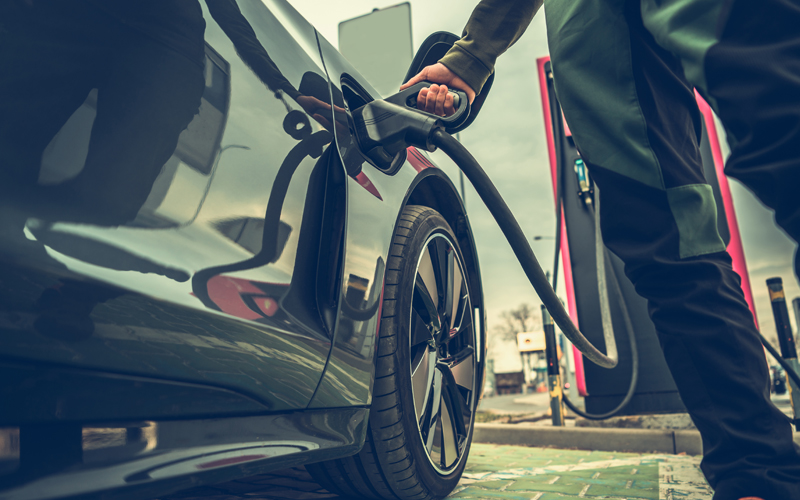Addressing The Top Electric Vehicle Myths

- With the UK Government set to ban the sale of new petrol and diesel vehicles by 2035, the electric revolution is certainly gathering pace.
- If you’re thinking of making the switch to an EV, you may have some doubts that have been fuelled by widespread electric vehicle myths.
- We’ve taken a closer look at the truth behind ten of the most common EV misconceptions.
Myth 1: EVs don’t have the range to meet people’s travel needs
You can typically expect a range of between 100 and 300 miles in a fully charged, standard-specification electric vehicle. Some premium models offer even more than this! Recent data suggests that the average car journey in the UK is 8.1 miles. That means that most drivers’ needs will easily be met by an EV, whether completing the daily commute or travelling further afield.
Myth 2: Only people with driveways can easily charge their EV
Around 30% of UK households don't have access to off-street parking, however, this needn’t be a barrier to owning an EV!
There are still many ways in which you can charge an electric vehicle without your own wallbox:
Public charge stations
There are now more than 61,000 public chargepoint connectors across the UK. These provide a convenient method of keeping your EV topped up when you’re out and about. Plus, many of them offer 'fast' or 'rapid' charging if you require a quick battery boost.
Workplace charging
The government’s Workplace Charging Scheme helps businesses with the cost of EV chargepoints. Many individuals spend long periods at their workplace, making it an ideal time to recharge. While employees may not be able to control whether their business opts into this scheme, it is still worth discussing with your employer.
On-street charging
Another important government initiative is the On-Street Residential Chargepoint Scheme (ORCS). This involves installing public chargepoints in areas where residents don't have off-street parking. It may include chargepoints being fitted to lamp posts or as free-standing units. Local authorities can apply for this grant.

Myth 3: There aren’t enough public chargepoints to meet demand
With over 61,000 (and counting) public chargepoint connectors across the UK, there are plenty of places to stop and charge your EV when you’re on the move.
These chargepoints are spread over 22,000 locations, and all regions in the UK have seen an increase in availability in the last few years.
Most new EVs come fitted with navigation systems that help you find your nearest chargepoint. Alternatively, you can use apps like Zap Map, or search the interactive map on our Electric Vehicle Hub to locate your local stations.
Myth 4: EVs take too long to charge
A lot of EV owners can charge their vehicles at home - overnight or when not in use. Similarly, if your workplace has charging facilities, you will be able to boost your car whilst you are working. You probably won’t notice the time it takes to charge your EV in these instances.
If you are on the road – it’s no secret that charging an EV will take longer than filling up a car with petrol or diesel. However, the onset of rapid charging means that many electric vehicle batteries can be boosted from around 10 - 80% in as little as 30 minutes. This is enough time to stop and take a driving break – which is ideal when travelling longer distances.

Myth 5: EVs are too expensive
New electric vehicles have a higher upfront cost than new petrol or diesel vehicles. However, you are likely to see savings in the long run, these include:
Lower maintenance costs
There are fewer moving parts in an electric motor compared to an internal combustion engine (ICE). This means EVs should have reduced maintenance costs compared to ICE vehicles.
Save on road tax
Electric vehicles are exempt from road tax. Remember, you will still need to tax your vehicle, even though you will have nothing to pay.
No extra charges
When travelling in an EV you won’t have to worry about Clean Air Zone or Low Emission Zone charges. Enjoy unrestricted urban travel!
Alternatively, have you considered a used electric car? This is a more affordable way to get behind the wheel of an EV without buying brand-new.
Myth 6: EVs can’t be driven or charged when it’s raining, or go through a carwash
You can rest assured that all EVs on our roads have been manufactured to comply with strict safety standards. Thorough testing ensures they are watertight, and electrical components are well insulated.
Myth 7: EVs feel like golf buggies on the roads
Electric vehicles offer a fun and easy driving experience! Instant torque from the electric motor means they have speedy acceleration. Thanks to their automatic transmission, they often feel smoother to operate. Plus, with no engine noise, they are a lot quieter too. All these factors combine to make the whole electric driving experience an enjoyable one.
Myth 8: The technology around EVs is too confusing
Many people think there are too many charging apps to manage, but it's actually quite simple to understand. Choose a network provider and register with them to get started. Popular providers include:
- ChargePoint
- EVgo
- BP Pulse
- GeniePoint
- IONITY
Each provider offers their own rates and perks, so we advise you to do your research in advance. Learn more about public EV charging networks.

Myth 9: Manufacturing EVs creates far more greenhouse gases than it saves
Over their lifetime, EVs produce fewer emissions than ICE vehicles.
EVs have a higher carbon footprint during manufacturing than ICE cars due to the battery production process. However, this is offset by their lower operational emissions.
Research has concluded that a new electric car produces one-third of the lifetime greenhouse gas emissions of a new petrol car. This considers vehicle production, use, fuel, and end of life.
Myth 10: EV batteries won’t last and will end up in landfill
Most EV batteries are given an 8-year or 100,000-mile warranty by their manufacturer. Many are reasonably expected to last longer than this.
At the end of its life, an EV battery is likely to be recycled instead of going to landfill. New technology allows processing centres to extract up to 90% of battery materials for recycling or reuse.
So, now you know the truth behind some of the most common electric vehicle myths, it could be time to embrace the new era!
Keep an eye on our Newsroom for all your EV updates or follow the links below for more.